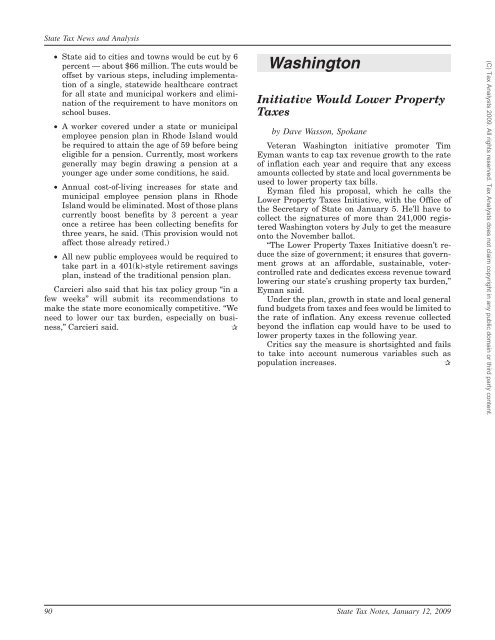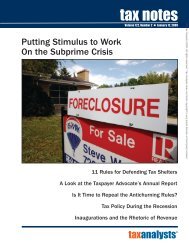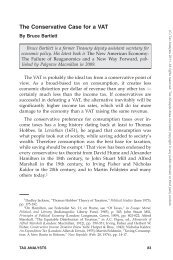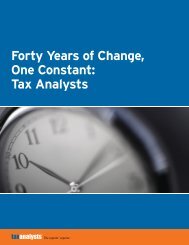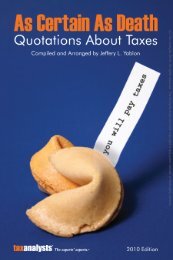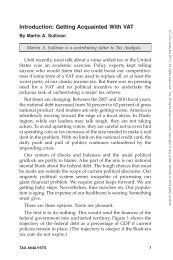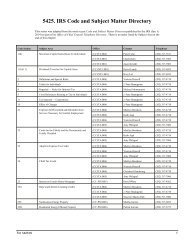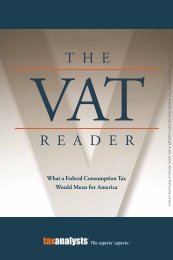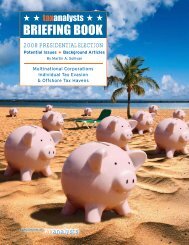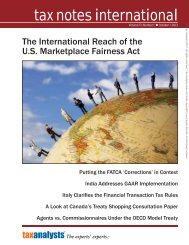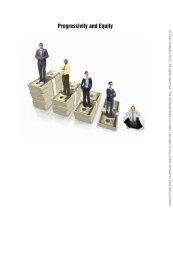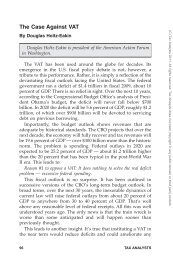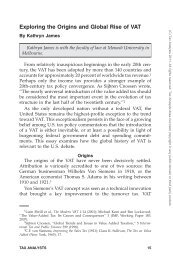state tax notes - Tax Analysts
state tax notes - Tax Analysts
state tax notes - Tax Analysts
You also want an ePaper? Increase the reach of your titles
YUMPU automatically turns print PDFs into web optimized ePapers that Google loves.
State <strong>Tax</strong> News and Analysis<br />
• State aid to cities and towns would be cut by 6<br />
percent — about $66 million. The cuts would be<br />
offset by various steps, including implementation<br />
of a single, <strong>state</strong>wide healthcare contract<br />
for all <strong>state</strong> and municipal workers and elimination<br />
of the requirement to have monitors on<br />
school buses.<br />
• A worker covered under a <strong>state</strong> or municipal<br />
employee pension plan in Rhode Island would<br />
be required to attain the age of 59 before being<br />
eligible for a pension. Currently, most workers<br />
generally may begin drawing a pension at a<br />
younger age under some conditions, he said.<br />
• Annual cost-of-living increases for <strong>state</strong> and<br />
municipal employee pension plans in Rhode<br />
Island would be eliminated. Most of those plans<br />
currently boost benefits by 3 percent a year<br />
once a retiree has been collecting benefits for<br />
three years, he said. (This provision would not<br />
affect those already retired.)<br />
• All new public employees would be required to<br />
take part in a 401(k)-style retirement savings<br />
plan, instead of the traditional pension plan.<br />
Carcieri also said that his <strong>tax</strong> policy group ‘‘in a<br />
few weeks’’ will submit its recommendations to<br />
make the <strong>state</strong> more economically competitive. ‘‘We<br />
need to lower our <strong>tax</strong> burden, especially on business,’’<br />
Carcieri said.<br />
✰<br />
Washington<br />
Initiative Would Lower Property<br />
<strong>Tax</strong>es<br />
by Dave Wasson, Spokane<br />
Veteran Washington initiative promoter Tim<br />
Eyman wants to cap <strong>tax</strong> revenue growth to the rate<br />
of inflation each year and require that any excess<br />
amounts collected by <strong>state</strong> and local governments be<br />
used to lower property <strong>tax</strong> bills.<br />
Eyman filed his proposal, which he calls the<br />
Lower Property <strong>Tax</strong>es Initiative, with the Office of<br />
the Secretary of State on January 5. He’ll have to<br />
collect the signatures of more than 241,000 registered<br />
Washington voters by July to get the measure<br />
onto the November ballot.<br />
‘‘The Lower Property <strong>Tax</strong>es Initiative doesn’t reduce<br />
the size of government; it ensures that government<br />
grows at an affordable, sustainable, votercontrolled<br />
rate and dedicates excess revenue toward<br />
lowering our <strong>state</strong>’s crushing property <strong>tax</strong> burden,’’<br />
Eyman said.<br />
Under the plan, growth in <strong>state</strong> and local general<br />
fund budgets from <strong>tax</strong>es and fees would be limited to<br />
the rate of inflation. Any excess revenue collected<br />
beyond the inflation cap would have to be used to<br />
lower property <strong>tax</strong>es in the following year.<br />
Critics say the measure is shortsighted and fails<br />
to take into account numerous variables such as<br />
population increases.<br />
✰<br />
(C) <strong>Tax</strong> <strong>Analysts</strong> 2009. All rights reserved. <strong>Tax</strong> <strong>Analysts</strong> does not claim copyright in any public domain or third party content.<br />
90 State <strong>Tax</strong> Notes, January 12, 2009


